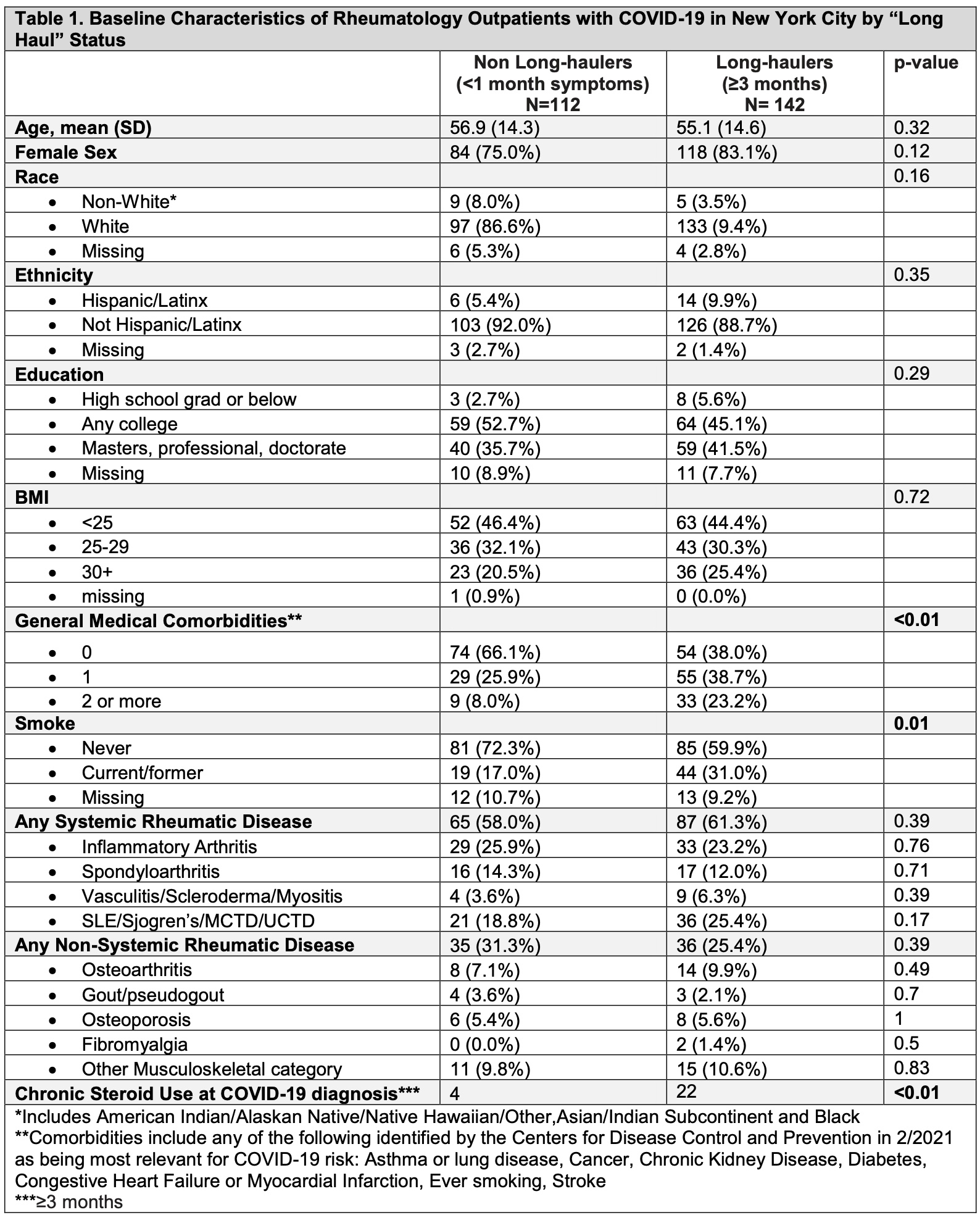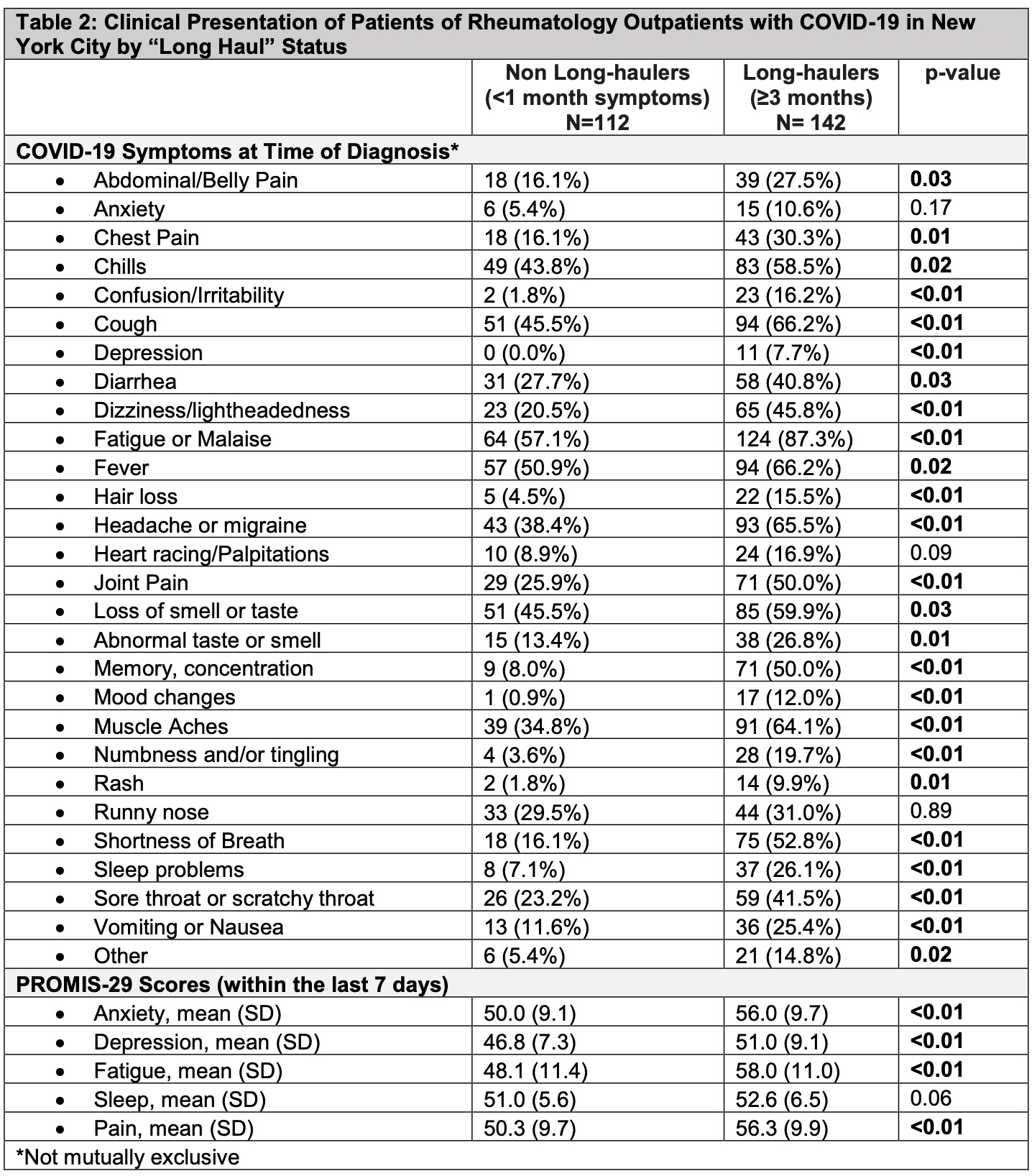Session Information
Date: Saturday, November 6, 2021
Title: Epidemiology & Public Health Poster I: COVID-19 & Vaccination (0084–0117)
Session Type: Poster Session A
Session Time: 8:30AM-10:30AM
Background/Purpose: COVID-19 ‘long-haulers’ are individuals who experience persistent symptoms after COVID-19 diagnosis. Whether this is of particular concern for rheumatic disease patients, due to their underlying immune dysregulation and use of immunosuppressive medications, is poorly studied. We evaluated the prevalence of “long haul” COVID-19 symptoms as well as its potential risk factors in Rheumatology outpatients in New York City.
Methods: We emailed a secure web-based survey on March 5, 2021 to 7,505 patients aged ≥18 years evaluated at least once by a rheumatologist between 2018-2020 at a large Rheumatology center in New York City and who previously agreed to participate in surveys on COVID-19. We included patients who completed a questionnaire on COVID-19 history, and also collected data on sociodemographics, medical comorbidities, medication use, and health related quality of life using PROMIS-29. ICD-10 algorithms identified patients with SRD. COVID-19 status was confirmed (self-report of a positive nasopharyngeal PCR or antigen test) or suspected (told by a healthcare provider of a COVID-19 diagnosis); the latter was included as testing was not readily available early in the pandemic in New York. We defined COVID “long haul” as symptoms persistent for ≥3 months and used descriptive statistics to compare factors associated with this group compared to patients with COVID-19 symptoms < 1 month.
Results: Among 2572 patients (34.3%) who completed our COVID-19 questionnaire, 254 patients indicated a history of suspected/confirmed COVID-19. 142 (55.9%) patients indicated ≥3 months of COVID-19 symptoms and 112 (44.09%) had < 1 month. No differences in demographics were noted between the ≥3 months versus < 1 month groups (Mean age 55.1 [14.6] vs. 56.9 [14.3] years; 83.1% vs. 75% female; 93.7% vs. 86.6% White, and 9.9% vs. 5.4% Hispanic/Latinx) (Table 1). COVID-19 long-haulers were more likely to have ≥1 or more medical comorbidities (Table 1) and to be a current or former smoker. No difference in SRD or non-SRD status was observed; only 2 patients with long haul symptoms had Fibromyalgia. Patients with long-haul COVID-19 were more likely to have used corticosteroids for ≥3 months at time of COVID-19 diagnosis (p=0.002). The long-haul group had significantly higher frequency of most COVID-19 symptoms at presentation, most commonly chills, cough, fatigue/malaise, headache/migraine, loss of smell or taste, muscle aches, memory/concentration problems, joint pain, and shortness of breath (Table 2). PROMIS-29 T-scores demonstrated significantly and clinically worse anxiety, depression, fatigue and pain in the long hauler group (Table 2).
Conclusion: Over half of rheumatology outpatients with COVID-19 reported persistent symptoms for ≥3 months; these “long hauler” patients were more likely to have more medical comorbidities, a smoking history, and use chronic corticosteroids at time of COVID-19 diagnosis. COVID-19 symptoms at presentation were more common in long-haulers, who also reported worse quality of life. Future prospective analyses accounting for additional potential covariates are underway to identify risk factors in this vulnerable group.
To cite this abstract in AMA style:
Barbhaiya M, Jannat-Khah D, Levine J, Do H, Gordon J, Bykerk V, Mandl L. Risk Factors for “Long Haul” COVID-19 in Rheumatology Outpatients in New York City [abstract]. Arthritis Rheumatol. 2021; 73 (suppl 9). https://acrabstracts.org/abstract/risk-factors-for-long-haul-covid-19-in-rheumatology-outpatients-in-new-york-city/. Accessed .« Back to ACR Convergence 2021
ACR Meeting Abstracts - https://acrabstracts.org/abstract/risk-factors-for-long-haul-covid-19-in-rheumatology-outpatients-in-new-york-city/


